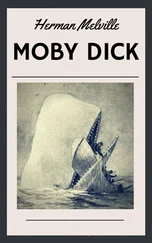"But your scruples: do they move as in a dusk? Challenge them. Make them advance and declare themselves. Come now: do they import something like this? If, mindless of palliating circumstances, we are bound to regard the death of the Master-at-arms as the prisoner's deed, then does that deed constitute a capital crime whereof the penalty is a mortal one? But in natural justice is nothing but the prisoner's overt act to be considered? How can we adjudge to summary and shameful death a fellow-creature innocent before God, and whom we feel to be so? — Does that state it aright? You sign sad assent. Well, I too feel that, the full force of that. It is Nature. But do these buttons that we wear attest that our allegiance is to Nature? No, to the King. Though the ocean, which is inviolate Nature primeval, tho' this be the element where we move and have our being as sailors, yet as the King's officers lies our duty in a sphere correspondingly natural? So little is that true, that in receiving our commissions we in the most important regards ceased to be natural free-agents. When war is declared are we the commissioned fighters previously consulted? We fight at command. If our judgements approve the war, that is but coincidence. So in other particulars. So now. For suppose condemnation to follow these present proceedings. Would it be so much we ourselves that would condemn as it would be martial law operating through us? For that law and the rigour of it, we are not responsible. Our avowed responsibility is in this: That however pitilessly that law may operate, we nevertheless adhere to it and administer it.
"But the exceptional in the matter moves the hearts within you. Even so too is mine moved. But let not warm hearts betray heads that should be cool. Ashore in a criminal case will an upright judge allow himself off the bench to be waylaid by some tender kinswoman of the accused seeking to touch him with her tearful plea? Well the heart here denotes the feminine in man is as that piteous woman, and hard tho' it be, she must here be ruled out."
He paused, earnestly studying them for a moment; then resumed.
"But something in your aspect seems to urge that it is not solely the heart that moves in you, but also the conscience, the private conscience. But tell me whether or not, occupying the position we do, private conscience should not yield to that imperial one formulated in the code under which alone we officially proceed?"
Here the three men moved in their seats, less convinced than agitated by the course of an argument troubling but the more the spontaneous conflict within.
Perceiving which, the speaker paused for a moment; then abruptly changing his tone, went on.
"To steady us a bit, let us recur to the facts. - In war-time at sea a man-of-war's-man strikes his superior in grade, and the blow kills. Apart from its effect, the blow itself is, according to the Articles of War, a capital crime. Furthermore-"
"Ay, Sir," emotionally broke in the officer of marines, "in one sense it was. But surely Budd purposed neither mutiny nor homicide."
"Surely not, my good man. And before a court less arbitrary and more merciful than a martial one, that plea would largely extenuate. At the Last Assizes it shall acquit. But how here? We proceed under the law of the Mutiny Act. In feature no child can resemble his father more than that Act resembles in spirit the thing from which it derives — War. In His Majesty's service — in this ship indeed — there are Englishmen forced to fight for the King against their will. Against their conscience, for aught we know. Tho' as their fellow-creatures some of us may appreciate their position, yet as navy officers, what reck we of it? Still less recks the enemy. Our impressed men he would fain cut down in the same swath with our volunteers. As regards the enemy's naval conscripts, some of whom may even share our own abhorrence of the regicidal French Directory, it is the same on our side. War looks but to the frontage, the appearance. And the Mutiny Act, War's child, takes after the father. Budd's intent or non-intent is nothing to the purpose.
"But while, put to it by these anxieties in you which I can not but respect, I only repeat myself — while thus strangely we prolong proceedings that should be summary — the enemy may be sighted and an engagement result. We must do; and one of two things must we do — condemn or let go."
"Can we not convict and yet mitigate the penalty?" asked the junior Lieutenant here speaking, and falteringly, for the first.
"Lieutenant, were that clearly lawful for us under the circumstances, consider the consequences of such clemency. The people" (meaning the ship's company) "have native-sense; most of them are familiar with our naval usage and tradition; and how would they take it? Even could you explain to them — which our official position forbids — they, long moulded by arbitrary discipline have not that kind of intelligent responsiveness that might qualify them to comprehend and discriminate. No, to the people the Foretopman's deed, however it be worded in the announcement, will be plain homicide committed in a flagrant act of mutiny. What penalty for that should follow, they know. But it does not follow. Why? they will ruminate. You know what sailors are. Will they not revert to the recent outbreak at the Nore? Ay. They know the well-founded alarm — the panic it struck throughout England. Your clement sentence they would account pusillanimous. They would think that we flinch, that we are afraid of them — afraid of practising a lawful rigour singularly demanded at this juncture lest it should provoke new troubles. What shame to us such a conjecture on their part, and how deadly to discipline. You see then, whither, prompted by duty and the law, I steadfastly drive. But I beseech you, my friends, do not take me amiss. I feel as you do for this unfortunate boy. But did he know our hearts, I take him to be of that generous nature that he would feel even for us on whom in this military necessity so heavy a compulsion is laid."
With that, crossing the deck he resumed his place by the sashed port-hole, tacitly leaving the three to come to a decision. On the cabin's opposite side the troubled court sat silent. Loyal lieges, plain and practical, though at bottom they dissented from some points Captain Vere had put to them, they were without the faculty, hardly had the inclination, to gainsay one whom they felt to be an earnest man, one too not less their superior in mind than in naval rank. But it is not improbable that even such of his words as were not without influence over them, less came home to them than his closing appeal to their instinct as sea-officers in the forethought he threw out as to the practical consequences to discipline, considering the unconfirmed tone of the fleet at the time, should a man-of-war's-man's violent killing at sea of a superior in grade be allowed to pass for aught else than a capital crime demanding prompt infliction of the penalty.
Not unlikely they were brought to something more or less akin to that harassed frame of mind which in the year 1842 actuated the Commander of the U.S. brig-of-war Somers to resolve, under the so-called Articles of War, Articles modelled upon the English Mutiny Act, to resolve upon the execution at sea of a midshipman and two petty-officers as mutineers designing the seizure of the brig. Which resolution was carried out though in a time of peace and within not many days' of home. An act vindicated by a naval court of inquiry subsequently convened ashore. History, and here cited without comment. True, the circumstances on board the Somers were different from those on board the Indomitable . But the urgency felt, well-warranted or otherwise, was much the same.
Says a writer whom few know, "Forty years after a battle it is easy for a non-combatant to reason about how it ought to have been fought. It is another thing personally and under fire to direct the fighting while involved in the obscuring smoke of it. Much so with respect to other emergencies involving considerations both practical and moral, and when it is imperative promptly to act. The greater the fog the more it imperils the steamer, and speed is put on tho' at the hazard of running somebody down. Little ween the snug card-players in the cabin of the responsibilities of the sleepless man on the bridge."
Читать дальше












